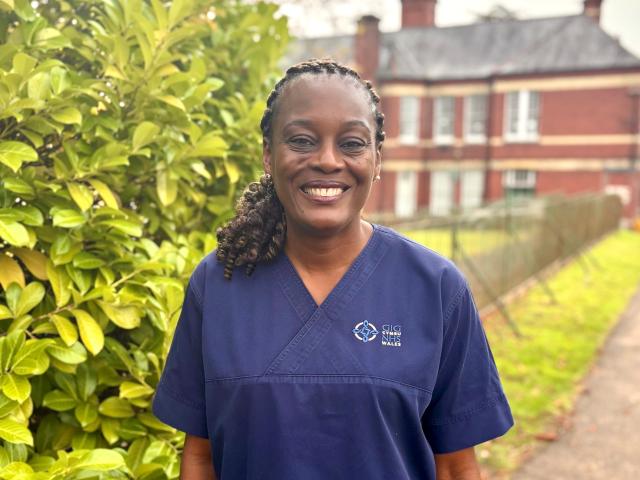
Groundbreaking research study into earlier diagnosis of dementia opens in Wales
16 October
A groundbreaking UK-wide research study supported by Health and Care Research Wales which combines blood biomarkers with genetic testing and artificial intelligence to speed up diagnoses of dementia and reduce waiting times is launching in Wales this week.
Aneurin Bevan University Health Board will be the first site to open to recruitment for the SANDBOX study, which is the first UK study to bring these tools together at scale within routine clinical pathways.
It will be rolled out across health boards in Wales as well as sites in England and Scotland, making it one of the most comprehensive real-world dementia research programmes in the UK.
SANDBOX, a national study sponsored by Prima Mente and led by Imperial College London, is enrolling 1,000 patients to evaluate a new, biologically informed triage system that begins after GP referral, using artificial intelligence, digital cognitive testing, Alzheimer’s-specific blood biomarkers, and testing of genetic factors relevant to dementia. These tools support diagnostic clarity and help clinicians better prioritise patients based on risk and urgency.
The study’s hybrid model supports both in-clinic and remote participation. Novel blood collection kits will maintain sample quality at room temperature - removing the need for cold-chain logistics and facilitating access across different NHS settings.
In this phase of the trial, SANDBOX will not replace standard NHS protocols, but will give clinicians early access to advanced tools that may aid diagnosis and reduce time to diagnosis. These tools are layered into the existing system to support triage and build the evidence base for future integration.
Dr Chineze Ivenso, Health and Care Research Wales Specialty Lead for Dementias and Neurodegeneration and a Consultant in Old Age Psychiatry at Aneurin Bevan University Health Board, said: “The number of people being diagnosed with dementia is growing year on year, making research into this complex and challenging condition even more vital.
We are really proud to be able to bring this significant and exciting study to Gwent and Wales, to push the boundaries of our understanding of this devastating condition and help support the thousands of families dealing with a dementia diagnosis each year.
“Bringing together this comprehensive range of factors will help identify patients much sooner, enabling them to access treatment and support at an earlier stage.”
SANDBOX Chief Investigator Dr Ivan Koychev, Head of Clinical Translation at Prima Mente and Associate Professor of Neuropsychiatry at Imperial College London added: “We are at a turning point in dementia diagnosis. By combining blood biomarkers, genetic testing and artificial intelligence, SANDBOX is the first study in the UK to integrate these tools within real NHS pathways. Our aim is to give clinicians better, faster insights so patients get the right care at the right time. Earlier and more accurate diagnosis not only supports patients and families but also ensures timely access to new treatments as they become available.”
"Until you have a diagnosis, you can't get medication"
It took over two years of tests before Kathryn White, 74, a retired postmistress from Pontllanfraith, was diagnosed with Alzheimer’s in July 2024.
Kathryn’s husband Michael said: “We began to worry when Kathryn got lost while driving to meet me and a friend in Cardiff, a journey she has made many times. The same thing happened a few more times, so we went to the doctor. Kathryn did some cognitive tests, which came back borderline, but we had a feeling something was going on. Over the next two and a half years Kathryn had a whole series of tests, at hospitals all over South Wales, but they all came back normal. Finally we met Dr Ivenso who referred Kathryn for a lumbar puncture and that came back positive.”
While lumbar puncture is an effective way to aid accurate diagnosis of Alzheimer’s, by analysing spinal fluid, blood biomarker testing is a less invasive procedure, which may have enabled Kathryn to be diagnosed sooner.
Michael added: “We are both retired and were able to get to the appointments, but it was still draining. The worst thing was that until you have a diagnosis, you can’t get medication. In that way getting the diagnosis was a relief. Now Kathryn is on medication to slow the progression. She can struggle with short-term memory, but enjoys seeing friends and spending time with our children, grandchildren and great-grandchildren.”
Kathryn and Michael have taken part in a number of studies since her diagnosis. Michael added:
If you’re getting a quick diagnosis, you’re finding the problem sooner. The more people that get involved in research, the more likely you are to find the answers. More treatments will appear and improve as a result of research, so if there’s anything we can do, we’ll do it. It could help other people.”
Professor Isabel Oliver, Chief Medical Officer for Wales, added: “The quality and breadth of research and development activity over the last ten years has been nothing short of inspirational, and through studies like SANDBOX, FAKTION and AMT-130, we are showing that Wales plays a big part in helping to discover the diagnostics, therapies and treatments of the future, as well as the role that research and evidence plays in helping to shape policy both domestically, nationally and internationally.
“Over the next ten years we will build on this legacy to strengthen health and care research further in Wales as an important and necessary part of our efforts to secure a healthier and fairer Wales.”